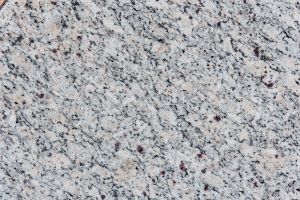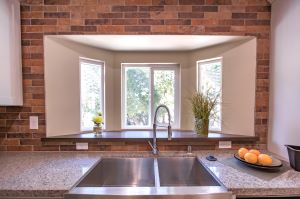Can You Fix Quartz & Granite Countertop Discoloration?
Serving Portland OR, Vancouver WA, and the Oregon Coast

The appearance of discoloration, dullness, and staining can be disheartening for those who’ve invested in granite and quartz countertops. Fortunately, the majority of discoloration, dullness, or staining issues are related to water and typically affect only the surface of the stone. These problems can be prevented with proper care and resolved with the right techniques.
If you want to learn more about how to remove stains from your granite and quartz countertops, keep reading!
What Causes Discoloration on Granite & Quartz Countertops?
Your granite or quartz countertops are a testament to elegance and sophistication in your home. Yet, despite their beauty and durability, they aren’t immune to certain challenges.
In this guide, we’ll explore three common adversaries that can threaten the pristine appearance of your beloved countertops:
- Soap Buildup: Soap residue can linger on freshly cleaned surfaces, including countertops. It may require substantial rinsing to remove before it dries. You can identify soap buildup by its dull, streaky, oily, or hazy appearance. If it can be scratched off with a fingernail or vigorous rubbing with a clean cloth, it’s probably dried soap on the surface. While there are cleaners available that don’t leave this residue, soap and water are often too convenient to avoid. When using soap and water, use a small amount of mild soap without oils or acids and rinse vigorously with clean water before the soap has a chance to dry.
- Hard Water: If your water source is a well, you’re likely dealing with hard water containing iron, magnesium, and calcium. When left on your stone countertop to evaporate, it leaves deposits similar to the spots on dishes, glasses, and shower stalls. Removing hard water stains and deposits from granite or other natural stone countertops can be challenging, so it’s essential to use products specially designed for hard water that won’t damage natural stone. Avoid using ammonia, as it can damage marble and, if used regularly, granite and other natural stone countertops. The best preventive measure is to wipe up hard water promptly with a clean cloth to prevent mineral deposits.
- Acidic Water or Cleaners: No sealer can prevent acids from damaging or etching the surface of a stone countertop. While granite is relatively resistant to etching, constant exposure to acidic city water or citric cleaning products can gradually erode the polished surface, leaving it dull. You can test your water’s acidity with a common pH test kit. If it tests positive, avoid cleaning your counters with tap water and opt for a natural stone cleaner. Restoring a hazy, etched countertop to its original shine and polish requires the expertise of a local stone restoration company.
How to Protect Your Quartz and Granite Countertops from Staining & Discoloration
We understand that protecting your investment is important to you. Here are a few tips on how you can help protect your quartz and granite countertops from staining:
- Seal Your Countertops: Apply an appropriate sealant to create a protective barrier on the surface. Follow the manufacturer’s recommendations for sealing frequency.
- Clean Spills Promptly: Act quickly to blot up spills with a soft cloth or paper towel to prevent stains from setting in.
- Use Coasters and Cutting Boards: Place coasters under glasses and cups and use cutting boards to prevent moisture rings and scratches.
- Avoid Harsh Cleaners: Use gentle, pH-balanced cleaners for daily maintenance and avoid abrasive or acidic cleaners that can damage the surface.
- Regular Maintenance: Clean your countertops regularly and reapply sealant as needed, following the manufacturer’s guidelines for care and maintenance.
Check Out Our Blog On The Best Granite & Quartz Cleaners
Basic Tips for Getting Rid of Countertop Stains
If your countertops are stained, here are a few tips on how to remove them.
- Identify the Stain: Determine the type of stain—whether it’s from food, liquids, or other substances—to choose the appropriate removal/cleaning method.
- Blot Fresh Stains: Act swiftly by blotting fresh stains with a clean, dry cloth to soak up as much as possible.
- Gentle Cleaning Solution: Create a mild cleaning solution by mixing a pH-balanced cleaner with warm water. Avoid abrasive or acidic cleaners.
- Delicate Scrubbing: Gently scrub the stained area in a circular motion using a soft cloth or sponge dampened with the cleaning solution.
- Thorough Rinse: Rinse the countertop thoroughly with clean water to remove any residue, ensuring it’s completely dry afterward.

Your Local Quartz and Granite Installation Company
If you’re seeking guidance on maintaining your granite countertops or require professional assistance with issues like cracks or sealant wear, don’t hesitate to reach out to the skilled team at Crowley’s Granite in Vancouver, WA. Our experts have the expertise and equipment necessary to ensure your granite & quartz countertops maintain their stunning appearance for years to come.
Providing an exceptional customer experience is our priority, so feel free to contact us today to connect with one of our knowledgeable professionals!
READY FOR BEAUTIFUL COUNTERTOPS?
Our team of experts is here to answer all your questions – we can even schedule a no-obligation, in-person or video estimate.
READY FOR BEAUTIFUL COUNTERTOPS?
Ask our team of experts or schedule a no-obligation Zoom call or in-person estimate to get started!
How to Remove Stains from Granite & Quartz Countertops in Portland OR & Vancouver WA
Serving Portland OR, Vancouver WA, and the Oregon Coast
Portland OR | Beaverton OR | Tualatin OR | Tigard | Lake Oswego | Canby | Wilsonville | SW Portland | NW Portland | Hillsboro | Astoria | Gearhart | Seaside | Cannon Beach | Manzanita
King City OR | Gresham | Milwaukie | Oregon City | Clackamas | Troutdale | Forest Grove | Camas | Vancouver WA | Washougal | Salmon Creek | Battle Ground | Rockaway Beach | Tillamook | Pacific City | Lincoln City | Newport
Home » Quartz Countertops » How to Remove Stains from Granite & Quartz Countertops
